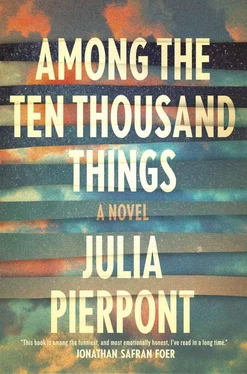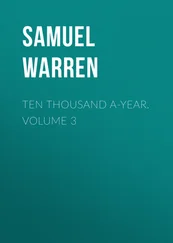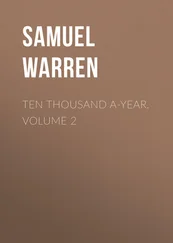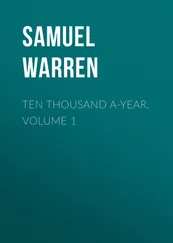“Okay, Kay,” he said when she came shuffling through the lobby, backpack heavy with weekend things. She got to the elevator door just as it opened, and inside her button was pushed already. A magic trick Angel liked to perform. Kay stuck her head out to gape at him, as always, the suggestion of applause, and Angel laughed high and long, different from his laugh with the adults.
The door was sliding shut when Angel held up a finger — wait — and ran around to the service elevator where they kept the packages. He came back with a box.
“For Mommy,” Angel said.
Riding up in the elevator, she turned the box around in her arms. Its flaps were tucked instead of taped together, and there wasn’t any postage or even a street address. And another thing: It was addressed, in black Sharpie, to Mrs. Jack Shanley. No one called her mother that except for Kay’s grandparents, her father’s mother.
In the light of the hall, she noticed something pink where the flaps left an opening. The one thing she would not confess to after that night, for which she would always feel a flush of shame, was the thought that inside the box was a present for her.
Her birthday was not until September, and they observed Easter only in candy aisles the day after. However. If it was a gift for her, she didn’t want to wait until the fall to get it, and if it was for her mother, or her father, or for Simon, then there wasn’t any harm checking.
Inside, it was just paper. So many pieces of paper, thrown together like tickets in a raffle.
i went to that dinner party in red hook tonight. all the talk was about what’s happening in syria, what’s happening in egypt, and i can only think about what’s happening with you.
The feeling that her domino eyes were running over something she wasn’t supposed to see. She tried to make them stop, or to see without reading, but they could not, would not stop.
i can’t explain why i get so sad when you make me so happy
i’ve been thinking of how you pressed my hand against your neck
show me your cunt
And right there, slid off the top, the winning ticket, the pink that had drawn her in: an envelope. This, too, was addressed to her mother, but it wasn’t sealed, and so she opened it. The letter was the only thing in the box that had been written by hand.
Dear Deborah,
And:
I began sleeping with your husband last June.
And:
I know about Kay.
She redid the flaps, held the box under her arm, and let herself into the apartment. Clenching all her parts as she passed her mother and brother in front of the television.
“Kay?” her mother called. “Why so late?”
Quickly to her room, head down to hide her face. There was that little guy in her throat, the one that hurt when she wanted to cry.
Her mother’s shoes clicking nearer, she buried the box under a tangle of shirtsleeves on the floor of her closet just as the door swung open. “Babe? What happened to you? I tried Arlene.” Kay pretended to look for something in her bottom dresser drawer. “She never picks up. I don’t like that woman.” Kay was moving handfuls of clothes from one end of the drawer to the other. “Did you hear me?”
“She’s a good mom.” She hadn’t meant to defend Racky’s mother. Feeling herself start to cry, she dug deeper into the drawer. Nightgown. Where was her yellow nightgown?
“Baby, did something happen?” Deb’s hand touched her shoulder and Kay twisted away. Her mother was quiet and so pretty, with her shiny hair and tiny waist, the evenness and natural tan of skin that Kay had not gotten from her. “Did you have a hard time with the girls, with learning the bike?”
The bike, the sleepover, those things seemed small and far away now, but remembering made everything worse: yet another place where her life was not as she wanted it to be: She had unkind friends. But in a way it was good to remember, it allowed for her tears. Her mother held her, and she let herself be held, in the orb of Deb’s Deb-scented perfume.
“Did you fall?”
Kay nodded. The wet skin under her eye stuck to her mother’s arm.
“Where does it hurt?”
She could follow instructions and give the box to her mother. She could throw it away. She could give it back to Angel, have him throw it away. What she couldn’t do, she knew in that moment, was go to her father, who might never tell her mother, if he had the box, because how could she live with him then.
For now the safest thing to do was nothing. The box was a secret she kept, the whole next day at school. She found herself in history, in math, in science, not knowing how she got there, not remembering the halls. Lockers slammed too loud, and Racky, the twins, everyone was always laughing about something, and what was so fucking funny all the time? She felt faraway and alien, her teachers going on about fractions and photosynthesis and the Underground Railroad. What did these things have to do with her life, where did they touch her?
It wasn’t Sunday but Monday that everything happened, and Simon might have been slightly, vaguely, barely, just approximately high. A little tiny bit.
He’d skipped the bus home and gone to the Short Stop diner down the hill from school, where the kids sat drinking bottomless cups of coffee with their omelets and buttered toast, tired-eyed teenagers who hibernated through breakfast every morning and so made up for it in the afternoons, ruining the dinners their mothers or housekeepers were making for them at home. Seniors held court over the seven booths, leaving the underclassmen to share barstools, cheek to cheek. Simon was fifteen but arrived with a senior from his religion class, Jared Berkoff, with whom he’d been partnered to present on Confucianism, a topic they’d drawn at random from Mr. Dionisio’s just-rinsed, still-damp coffee tumbler. Jared was a stoner, always high except on the social ladder, though the JAPs still invited him to their parties, and when one of the more inspired jocks discovered the effect of switching out a letter in Berkoff, a mascot was born. There were worse people for Simon to show up with. The diner was where deals were struck, where everyone went looking for drugs or for play. Jared was looking to score both.
Both arrived in the shape of Elena Gorbunova, a junior with a broad forehead and pretty, space-alien eyes. Simon had seen her before in the cafeteria, knew the tight turtlenecks that hugged her so that waist-up she might have been a figure skater.
“Gorbunova,” Jared said, flipping shut his phone. Clearly she was the one he’d been texting since they sat down in the back booth, next to a quiet senior who did studio art and whose cuffs and cuticles were always edged with paint. “Gorbunova’s going to smoke us out.”
Elena, with the slightest bend of her knee, managed to curtsy. Probably she and Jared had something — or used to have something or were about to have something — going on. She led them out the door, all hip bone, tonguing a sugar packet.
Elena got a steady supply of weed from her brother, Gorb, now a student at Manhattan College, which was in the Bronx, near their school. Gorb had been expelled from high school his sophomore year, but before that he’d been a star of the varsity fencing team, which practiced in the middle school gym. Simon remembered him, padded white and huge, like a walking sofa bed, with a wispy mustache and a silver mask under his arm, whipping a foil around the breezeway.
In the parking lot beside a shuttered tanning salon, the three of them squatted behind a car, and Elena set a yellow glass bowl on the ground. She pulled the weed apart, packed it herself. Sticky on her fingers, but she worked fast. She might have been failing out of PE, but clearly there were things she knew.
Читать дальше












